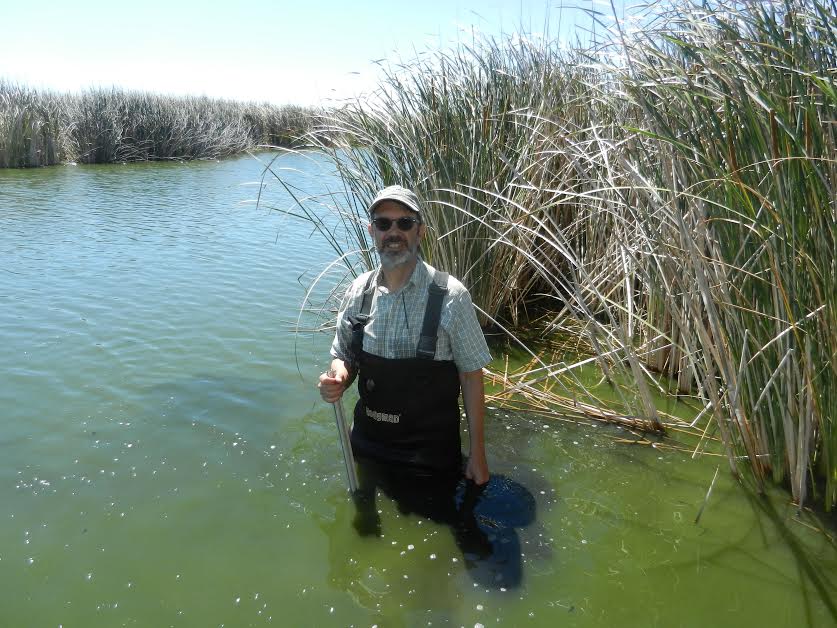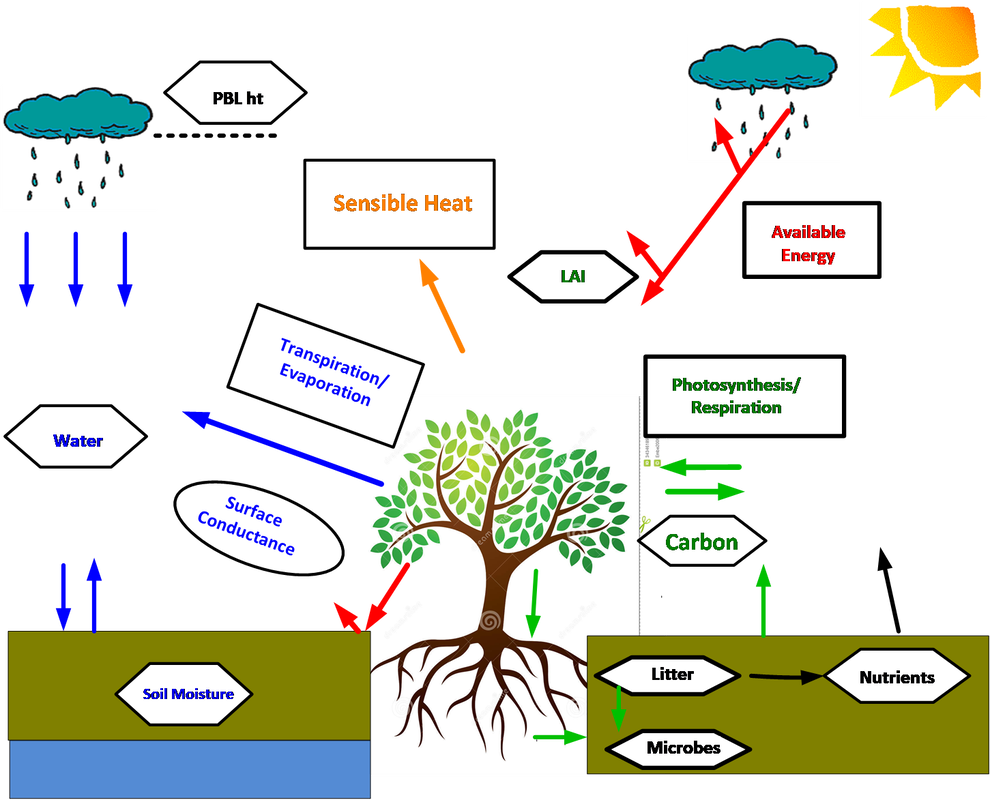| What does ecohydrology mean to you? If a picture is worth a thousand words, here is my vision of ecohydrology, which involves coupling between processes (energy, water and carbon fluxes) and coupling between scales and domains (ground water, soil, plant/roots and the state of the planetary boundary layer). For a prosaic explanation, we are interested in Ecohydrology of semi-arid and wet ecosystems, at their extremes. |
The second aspect of our research is on flooded ecosystems (rice and wetlands). We are interested in how these ecosystems produce methane and store carbon in anoxic sediments. We are also discovering surprises about the complex role of detritus and water temperature on evaporation and the role of plant exudates on methane production.
What are your undergraduate and graduate degrees in?
- BS in Atmospheric Science from University of California, Davis
- MS in Agricultural Engineering from University of Nebraska, Lincoln
- PhD in BioEnvironmental Engineering from University of Nebraska, Lincoln, with focus on Agricultural Meteorology
I have a long interest in evaporation of plant canopies, starting with irrigating walnuts as a kid and taking Bill Pruitt’s evaporation course at Davis. My thinking became formalized in grad school. We studied evaporation and carbon exchange of soybeans and alfalfa with flux gradient methods. I wanted to know how and why the fluxes varied with hot, dry conditions. So, from the get-go we were measuring stomatal conductance and pre-dawn water potential. Hence, my focus on the ecophysiological control on ecosystem water exchange (as shown in the figure above). This mind set continued as I started to study evaporative fluxes of native forests in Tennessee and Canada. There, my ability to do ecohydrology was stymied because a drought would start and then it would rain, so I never got a wide enough range of conditions to satisfy myself. This changed when I moved back home to California and set up the savanna field sites.
My formal exposure to the field of ecohydrology came by reading the papers and books of Ignacio Rodriguez-Iturbe and collaborators.
What do you see as an important emerging area of ecohydrology?
Our mantra is to be able to assess evaporative fluxes ‘everywhere, all the time’. Now this requires understanding down regulation of evaporation with soil moisture deficits and upscaling evaporation with remote sensing. At present, satellite remote sensing is unable to peer deep enough into the soils. We are interested in the role of using plants as soil moisture sensors and using information they telecommunicate to the state of the boundary layer as a transmitter of that information. How well this works across the globe in different climates remains an open question.
We are also on the verge, with flux datasets reaching 20 years, on assessing whether and or how much ecosystem evaporation is responding to a warmer world with more CO2. There have been lots of inferential estimates but we need more direct measurements. And, here too, the answer may be conditional with time and location.
Do you have a favorite ecohydrology paper? Describe/explain.
Jarvis, P.G. and McNaughton, K.G., 1986. Stomatal Control of Transpiration - Scaling up from Leaf to Region. Advances in Ecological Research, 15: 1-49.
The paper resolves the conflict between ecophysiologists, who argue that warming may increase evaporation by forcing a greater vapor pressure at the leaf surface, with meteorologists, who argue that warming may reduce evaporation due to more longwave energy and sensible heat loss. It also ties together ideas on how, when and where evaporation is better coupled with available energy and/or canopy surface conductance and humidity deficits. It provides the paradigms on which I base the interpretation of much of my research in the past and today.
What do you do for fun (apart from ecohydrology)?
Until I was 52, I played pick-up soccer regularly.
Lately I have started throwing Master’s Level discus (1 kg). There is a group of us, age 65 to 80, who meet each Saturday in a cow field near Petaluma, CA and throw discus on a ring a friend built (Chileno Valley Discus Club). It is getting me back in shape and has helped me endure Covid. The only problem is I am not throwing as far as I did in high school. I am working hard to reach 30 m.
In addition, I continue to do day hikes, love listening to jazz and baking sour dough bread.


 RSS Feed
RSS Feed